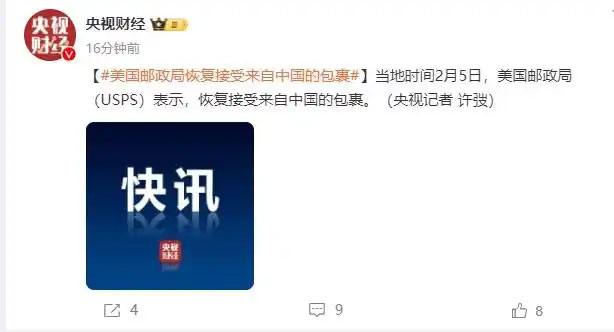

USPS has changed its stance and resumed accepting packages from China

The decision coincides with the Trump administration's additional tariffs on China, which took effect on February 4.
The specific reason for the USPS restrictions is unclear, but US President Donald Trump has eliminated the "minimum exemption" exemption for packages worth less than $800.

USPS is one of the largest civilian postal agencies in the United States, and major international express companies such as FedEx and UPS, its main competitors, have not yet issued an official statement on how to respond to the new policy and are still in the process of regular customs clearance.
Some analysts pointed out that the USPS stopped receiving packages is more symbolic, because about 90% of cross-border packages in the United States are currently transported by private logistics providers such as SF Express and UPS. The move is believed to be directly related to the Trump administration's latest trade policy in effect.
Shares of companies such as Alibaba and JD.com fell in Hong Kong. While these companies, as well as Temu, Shein and Amazon, have yet to comment on the matter, the market is already feeling the pressure from trade tensions between the United States and China.
Since Trump announced the imposition of comprehensive tariffs on China and the cancellation of the duty-free policy of goods under 800 US dollars, the US small package market has been in chaos, and logistics providers have reminded customers to truthfully fill in the goods information including but not limited to the name, amount, quantity, destination country HS Code (customs code), weight and other goods information. Due to the cancellation of the $800 exemption, the entry of small bags needs to follow the normal customs clearance procedures. In order to cope with the supply chain risk, logistics providers have adjusted the price and charged customs clearance fees and advance tariff deposits.





